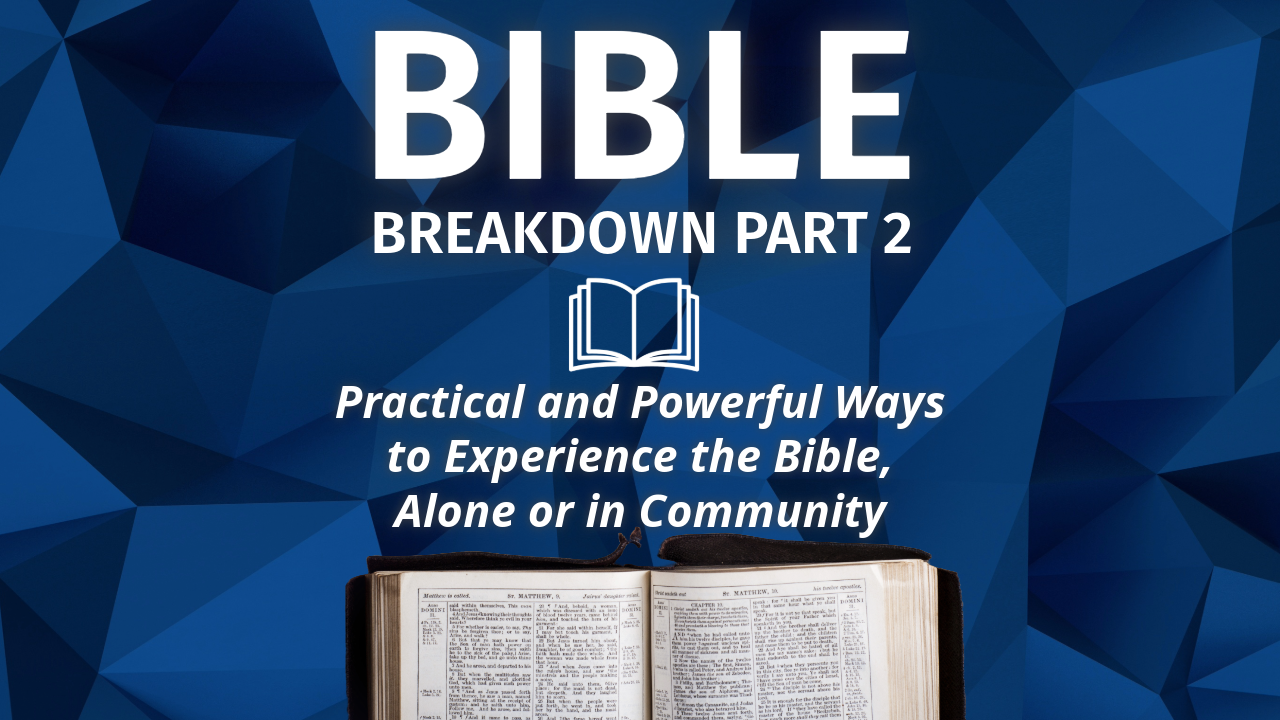Bible Breakdown Pt 2: Practical and Powerful Ways to Experience the Bible, Alone or in Community.
Bible Reading: Where to begin?
We all recognize the incredible value of regular Bible reading—it draws us closer to God and provides guidance for our lives. Yet, one of the biggest hurdles is often simply figuring out where to start or how to really get something meaningful from our reading. That’s why I want to introduce you to two practical tools: Lectio Divina (Latin for Divine Reading) is an ancient, simple, and beautiful practice, helping you to meditate on God’s word personally and intimately. And remembering that we are part of a church family, Discovery Bible Study (DBS)brings the wisdom and accountability of the community into your Bible experience. It’s about getting the most from your Bible, whether you’re studying alone or with others. Let’s describe each of these methods so you can give them a try.

LECTIO DIVINA
The practice of Lectio Divina, originating in the early Christian monasteries, encourages a gradual, prayerful approach to Scripture, aiming for a heart-deep understanding and personal encounter with God. It’s a great tool to use in the time you spend alone with God. The approach is simple and involves 4 steps:
- Lectio (Reading): Pick a portion of scripture, we recommend a portion from our daily Bible Project reading plan.it doesn’t need to be long—sometimes just a single verse can offer more than enough. Read the selected scripture slowly several times. As you read, pay attention to each word and phrase. Let the reading be more than a simple scan of text; consider it an invitation to hear God’s voice speaking to you through His word.
- Meditatio (Meditation): Reflect on the text. Think about the parts that stick out to you and mull them over. Meditation here is not emptying the mind but filling it with the living word you’ve encountered. What images or thoughts does it conjure? Does it connect with your current life? Ask yourself why this specific piece of scripture is standing out to you today. Is there an action or a change of heart that it’s suggesting? Don’t rush to find answers; allow the Holy Spirit to guide your reflections. Write down your thoughts if it helps; journaling can be a powerful way to deepen this experience.
- Oratio (Prayer): As response to the meditation, engage in a conversation with God. This isn’t about formal prayer patterns; it’s more personal and intimate. Express what you’ve discovered and how it makes you feel. Are you thankful, confused, inspired, or challenged? Maybe you don’t feel particularly moved, and that’s worth bringing to God too. This is your opportunity to discuss with God what has come up for you during your reading and meditation. It’s like talking to a friend—be as sincere and open as you can be.
- Contemplatio (Contemplation): Conclude by resting in God’s presence. Set aside analysis and words to simply be with God. It’s akin to sitting beside a close friend without the need for words—you are simply together. If you find your mind wandering, gently bring your focus back to the presence of God, embracing the peace and love offered. This isn’t a time for planning or problem-solving. It’s simply a time for being with the One who loves you unconditionally.
That’s it. End your Lectio Divina practice with a moment of thankfulness for the revelations received and the time spent with God. Establish a routine, committing to go through these steps regularly. It will deepen your connection with the scriptures and more importantly, with God.
DISCOVERY BIBLE STUDY
Discovery Bible Study (DBS) is all about exploring the Bible with others. It’s designed to involve everyone, facilitating discussion, learning, and application of the word of God within a group setting. It’s the method we recommend for use when we gather as Home Churches or in small groups for Discipleship. It’s a joint effort and runs something like this:
The Process:
- Gathering: Form a group of people interested in studying the Bible. It could be friends, family, or church members. Agree on a regular time and place to meet that’s comfortable and free from distractions.
- Choosing a Passage: Pick a section of the Bible to read. This can range from a few verses to a whole chapter, often starting from one of the Gospels.
- Reading Aloud: One of the members of the group reads the chosen passage aloud. This helps everyone engage with the text and hear it from different perspectives.
- Retelling the passage: After reading, ask “What does this passage say?” and have a couple of group members attempt to retell what they just heard in their own words. The aim here is to engage everyone with the passage and ensure that all understand it.
- Discussion through Key Questions: Dive into the following questions avoiding the temptation to wander into discussion of topics not addressed in the passage. The aim is to focus on one passage of scripture and discover all we can about God, ourselves and life through it:
- “What does this teach us about God?”
- “What does this show about people?”
- “How can we apply this?”
- “Is there anything here that prompts me to change?”
- “Who else could benefit from hearing this?”
- Applying the Insights: Talk about how you can take these insights into your week. Decide on concrete actions that each member of the group will take before the next meeting based on what you have discovered.
- Closing with Commitment: Pray together for the strength to follow through, and agree to hold one another accountable. At the next meeting, begin by sharing experiences of trying to live out the previous week’s action step. This promotes personal growth and group encouragement.
DBS is an approach that empowers us to connect directly with the Bible, offering a means to not just interpret the words, but to make them a part of daily life, prioritising obedience to scripture not just understanding of it. It helps develop relationships with others as participants learn from and support each other. And by naturally leading group members to live out the scriptures and share their insights, DBS fosters both personal growth and wider community engagement.
Conclusion
So, there you have it—whether you’re in the mood for self-reflection or energized by group study, Lectio Divina and DBS have got you covered. They’re both solid ways to enrich your faith journey, and both immensely doable.
Your Next Steps?
Give Lectio Divina a try in your quiet time with the Lord today or round up your friends for a DBS session. Got experiences or insights to share? Drop us a comment, and let’s support each other in these practices.

